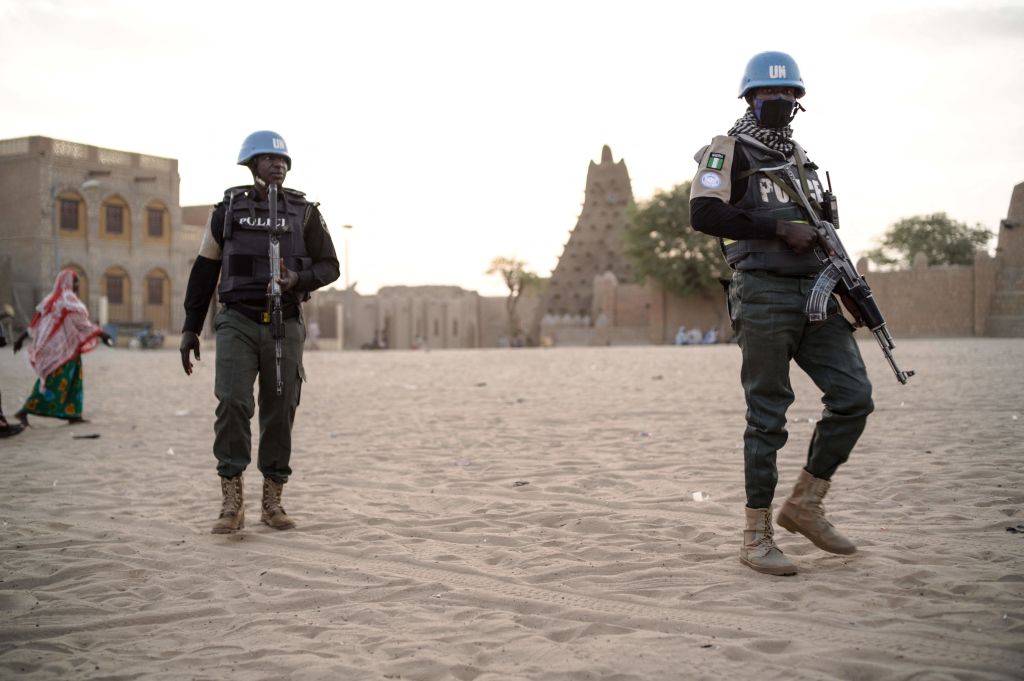ADF STAFF
A recent militant attack in central Mali illustrated the extreme challenges facing the United Nations peacekeeping mission, known as MINUSMA, and its uncertain future in the violence plagued country.
Three suicide car bombs and heavy gunfire shattered the early morning silence in the town of Sévaré in the Mopti region on April 22.
Extremist militants targeted a refugee camp, the town’s strategically important airport and the adjacent Malian military camp that reportedly housed Russian Wagner Group mercenaries.
A contingent of MINUSMA peacekeepers from Senegal responded and drove back the attackers.
The next day, two civilian members of the U.N. mission were attacked while assessing the damage at the Serema camp for internally displaced people.
“There was violence. Young people threw stones, pieces of wood,” MINUSMA spokesperson Fati Kaba told Radio France Internationale on April 23. “Our colleagues got away, but unfortunately we have a vehicle which is damaged.”
Kaba said a coordinated social media disinformation campaign that has gained traction falsely claims that the U.N. mission organizes terrorist attacks and seeks to legitimize the presence of violent extremist organizations.
“These messages are dangerous,” Kaba said. “Who could believe these absurd accusations against MINUSMA? There is absolutely nothing that justifies or excuses this type of action. We are deployed here with the consent and agreement of the Malian government, and our mandate is to support the efforts of the Malian authorities.
“If the calls for violence continue, it could be dangerous for our colleagues who do work for peace and security.”
With a volatile mix of extremist groups, former separatist rebels, local militias and lawless Russian mercenaries, the security situation in Mali continues to worsen. With it, the prospects of MINUSMA’s future could be growing dim.
Members of the U.N. Security Council have called for a review of the mission and have suggested profound changes to its mandate, which will be voted on in June.
“We should be ready to adapt and refocus the mission, reviewing any support that carries risks to the U.N.’s credibility and reputation,” British Ambassador to the U.N. Barbara Woodward said during an April 12 Security Council meeting.
U.N. officials and Security Council members have grown impatient with the military junta that rules Mali’s transitional government and contracted Russian mercenaries to combat the extremist militant groups.
Instead of making any progress in that fight, Wagner Group fighters have been accused of crimes against humanity, including massacring Malian civilians.
In a U.N. report earlier this year, Secretary-General António Guterres said, “the current situation is unsustainable. MINUSMA is a peacekeeping operation where there is no peace to keep.”
Guterres proposed three options for the peacekeeping mission’s future: increase its size, reduce its footprint, or withdraw troops and police and turn it into a political mission.
Alex Vines, of the Chatham House think tank, believes MINUSMA should be “drawn down” after the June mandate vote.
“It has increasingly failed to deliver on its mandate, and the Malian junta increasingly uses it as a scapegoat to blame for its own failures,” he told The National newspaper.
MINUSMA chief El-Ghassim Wane was diplomatic during and after an April 12 meeting of the U.N. Security Council in which he addressed the mission’s many issues.
“No one can deny that the mission is confronted with challenges,” he said to reporters after the meeting. “To operate in a territory as large as Mali in the current security conditions is not an easy task.
“I think the mere fact that the mission has been able to work and to operate unfailingly since it was deployed back in 2013 speaks volumes about the amount of effort, the commitment and the flexibility that the mission has demonstrated throughout its decadelong deployment.”
Wane listed the mission’s work on the ground: protection of civilians; support to local and national authorities; capacity building across multiple sectors; and promotion of reconciliation, civil rights and social cohesion.
MINUSMA has become the deadliest of all U.N. peacekeeping missions with 281 of its troops killed. It also is the most expensive U.N. mission with an annual cost of $1.26 billion.
The roughly 14,000-strong peacekeeping mission expects to face a critical shortage of personnel with the impending withdrawal of nearly 3,000 troops by Benin, Côte d’Ivoire, Germany and England.
For many locals, the mission is not doing enough. For U.N. officials, the country’s primary issue is its military rulers and their lack of interest in building peace, security and governance.
Guterres has highlighted how the Malian junta has imposed “restrictions on movement and access” on MINUSMA.
One U.N. official in Mali, who asked to remain anonymous, said that MINUSMA has made a significant positive impact on civilians’ lives despite the country’s problems, helping to fund infrastructure, mediate between communities, and provide logistical support to the health and judiciary sectors.
“Whatever is said, MINUSMA does a lot in areas where the state has long given up due to lack of funding or will,” the source told Agence France-Presse.
Wane called for the junta leaders to cooperate with and better support MINUSMA instead of blocking its movement and access throughout the country, blocking human-rights investigations, and blocking its use of drones.
“We continue to face challenges regarding the operations of our drones,” he said. “They are critical for the safety of our peacekeepers but also for the execution of our protection of civilians mandate. We are yet to arrive at a situation that is satisfactory.”

